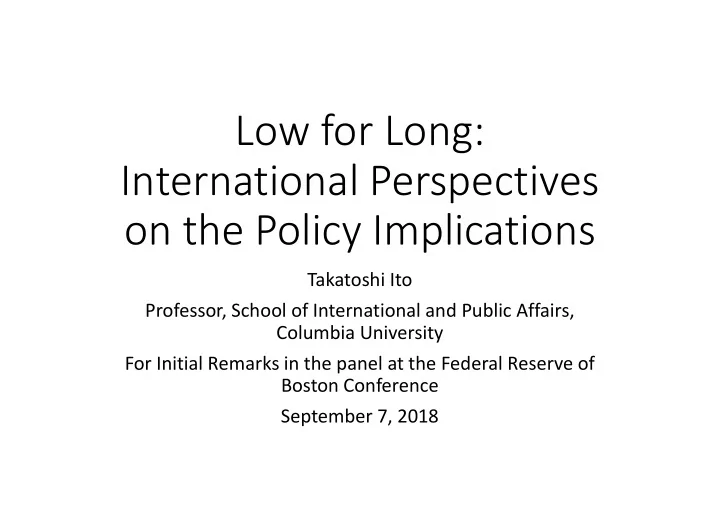

Low for Long: International Perspectives on the Policy Implications Takatoshi Ito Professor, School of International and Public Affairs, Columbia University For Initial Remarks in the panel at the Federal Reserve of Boston Conference September 7, 2018
• An “international currency war” has broken out, according to Guido Mantega, Brazil’s finance minister, as governments around the globe compete to lower their exchange rates to boost competitiveness. – Financial Times, Sept. 28, 2010 • “Does the currency depreciation that typically accompanies an easing of monetary policy unfairly disadvantage trading partners? The answer is generally no, for two reasons.” – Ben Bernanke, Polak Lecture, Nov. 5-6, 2015 2018/9/7 (c) Takatoshi Ito 2
Outline • Was QE (2009-2012) competitive devaluation? • “No” among advanced countries • But the Yen appreciated as BOJ stayed out of QE • EM with appreciation complained of currency war (mid 2010) • US argued that monetary policy is for domestic purposes; growth will benefit the world • Taper tantrum (2013) and exit from QE • EMs with depreciation complained • “Low for Too Long”? • “No” among advanced countries • Exporting easy money and a bubble to EM? • Maybe, in some EM, like China? • Could we have done it better? • Coordinated, global QE? • EM would find it difficult to follow. Better to adopt capita flow management • Let us see some data first 2018/9/7 (c) Takatoshi Ito 3
Tapering QE3 J-QQE QE1 2018/9/7 (c) Takatoshi Ito 4
Tapering QE3 J-QQE QE1 2018/9/7 (c) Takatoshi Ito 5
QE3 J-QQE QE1 2018/9/7 (c) Takatoshi Ito 6
“Currency War” Sept Taper Tantrum, May 2013 2010 QE1 QE3 J-QQE 2018/9/7 (c) Takatoshi Ito 7
Why was QE criticized more than conventional monetary policy? • With ZIRP, the currency channel became a primary transmission channel • Spillovers to other countries are greater • BOJ played a catch-up game with QQE in 2013 • EM countries experienced capital inflows (and complain) • Does US normalization (exit from QE and/or ZIRP) restore the equilibrium exchange rates? • EM countries experience capital outflows (and complain) 2018/9/7 (c) Takatoshi Ito 8
Bernanke defense • Does the currency depreciation that typically accompanies an easing of monetary policy unfairly disadvantage trading partners? The answer is generally no, for two reasons. • (1) “although monetary easing usually leads to a weaker currency and thus greater trade competitiveness, it also tends to increase domestic incomes, which in turn raises home demand for foreign goods and services.” • (2) “trading partners have the means to compensate for shifts in their international competitiveness through policy adjustments of their own” 2018/9/7 (c) Takatoshi Ito 9
Low for too Long? • Domestic • Bad for asset owners, asset managers and pension funds? • Encourages risky investment, resulting in a bubble? • What if a next recession comes before normalization? • International • Higher capital flows to and from EM countries? • Higher volatility (of Forex) to EM countries? • Exports of a financial bubble to EM countries? 2018/9/7 (c) Takatoshi Ito 10
Better alternative way? • Internationally coordinated Fiscal policy? Yes, we did in 2009 (London G20 Summit) • Increased government spending in each country • Effective in mitigating aggregate demand decline • But, spending went to some not-so-useful projects in some countries • Chinese ghost towns with local government debts • Internationally coordinated QE, possible? • Japan could have avoided a severe recession in 2009-10 if they adopted QE • EM could also adjust fiscal and monetary policy, temporarily • EM countries can also adopt capital flows management • A possible bubble can be managed with Macro-Pru 2018/9/7 (c) Takatoshi Ito 11
Recommend
More recommend